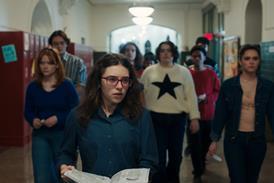Rotterdam is not the kind of festival to be big on celebrating numbers," says CineMart head Marit van den Elshout of the co-production market's 25th anniversary this week. "We'll do something but we won't be making a huge celebration."
Still, this is an opportune moment to take stock, "to look back at what CineMart has done in the past and how it has developed into what it is today," says producer Jeremy Nathan.
And there will still be a party. Former CineMart managers Ido Abram (now at the Binger Institute), Fortissimo founder Wouter Barendrecht, and Sandra den Hamer, the ex-festival director who has just taken up the reins at the Film Museum in Amsterdam, will attend.
When the first CineMart was held, the idea of festivals holding their own co-production markets was novel in the extreme. Now, it is more of a surprise when a festival does not hold such an event. "There are so many good co-production markets now, globally," says Nathan. "You almost can't have a festival without one."
The event was the brainchild of festival founder Hubert Bals. It was launched in 1984 and held in the Hilton Jardin Room. More than 30 international organisations were invited and works in progress from the likes of Bela Tarr, Jim Jarmusch and Peter Greenaway were screened. It soon developed into a bazaar where film-makers with projects in development could meet potential financiers.
In terms of its future, however, the question for CineMart is how to ensure it keeps an edge over its many imitators. Most other co-production markets are still in their infancy. CineMart, however, has a quarter of a century of experience.
Van den Elshout believes the event's quiet pragmatism is one of its chief recommendations. "The organisation is one of the main reasons CineMart still works so well," she says. "There are a lot of more exotically located festivals worldwide. Rotterdam is indeed a grey city. Festival-goers are stuck inside the Doelen for five days but because of the organisation, people can do a lot of business."
Her message is clear: CineMart is an efficient environment in which the 850 delegates can work. Producers with projects can expect to have an average of 10 half-hour meetings with potential backers each day.
At every Cannes, Venice and Berlin, among the titles vying for major honours, are films that have passed through CineMart, picking up at least some of their financing on the way. This list includes Lars von Trier's Breaking The Waves, Catherine Breillat's The Old Mistress, Hany Abu-Assad's Paradise Now, Dagur Kari's Noi The Albino, Peter Mullan's The Magdalene Sisters, Kim Ki-duk's Breath and John Sayles' Honeydripper.
The criteria for selection are flexible. The selectors are looking at the 'artistic quality' of a project and the track record of the director. They also prefer films that have 20%-25% of their budgets in place, but this rule is sometimes bent.
This year, the project selectors were deluged with more than 550 applications. Only 39 were chosen - less than in previous years. "We wanted to make it more exclusive but also to give every project the attention it deserves," van den Elshout says. "It's become a bit overcrowded. We became a little tougher in screening the production companies who want to come."
Asked to identify trends, van den Elshout points to the strength of the applications from Romanian film-makers. For example, buyers and sales agents are bound to be intrigued by Aurora and Home Sweet Home, Cristi Puiu's follow-ups to The Death Of Mr Lazarescu (2005). The films are intended as the second and third parts in a six-part series, starting with Lazarescu, entitled 'Six Stories from the Outskirts of Bucharest'.
Van den Elshout also notes CineMart is receiving more genre projects than in previous years. The event has always been arthouse driven. Nonetheless, CineMart is open to genre fare when it comes from directors with strong personal visions, hence the inclusion of work such as Eron Sheean's controversial genetics movie Errors Of The Human Body.
Many CineMart projects will go on to screen on the festival circuit. Some will be picked up by sales agents and acquired by distributors and broadcasters. Relatively few, however, will receive mainstream distribution. "These projects are definitely viable and they have a market, but in a certain niche," says van den Elshout. "We're not looking for projects that go on to become big box-office hits because that's not the type of film Rotterdam is showing." She adds that CineMart consults extensively with sales agents. "We talk about their slates, what they're looking for and how they follow up on projects. We know their tastes."
CineMart has close connections with the other strands of the festival, in particular with Rotterdam's Hubert Bals Fund, which supports film-makers from developing countries. The fund is showing 22 new films at the festival; nine are world premieres and all are competing for the new Dioraphte award worth $14,784 (EUR10,000). Meanwhile, film-makers whose shorts have shown in Rotterdam's main programme will often bring their features to CineMart.
The lowest-budget film at CineMart is $125,000 (EUR85,000) for Roh Gyeong-tae's Land Of Scarecrows. The highest budget is the $6.3m Callgirl by Mikael Marcimain (Sweden), about two underage girls who slept with top politicians during the period in office of Swedish prime minister Olaf Palme.
The film-makers invited include revered auteurs such as Palme d'Or winner Abbas Kiarostami, as well as relative newcomers. Some projects are close to completing their financing, while others are just starting.
Kiarostami's Certified Copy will shoot in Italy with an international cast headlined by Juliette Binoche. On the face of it, this does not look like a film that needs CineMart support. Nonetheless, French producers MK2 see Rotterdam as a perfect opportunity to drum up some early pre-sales.
"Choosing CineMart is a way to ground the film in its European environment, a few months before shooting in San Gimignano, Italy," notes MK2's Mathilde Henrot. "We believe CineMart, known for the quality of its choices, is an ideal place to present the film."
Asked what opportunities CineMart presents for securing presales and finding partners that other markets or co-production events do not, Henrot says: "It's an environment more dedicated to projects. Other markets like Berlin or Cannes are linked to a competitive festival and so the attention of co-producers and distributors is very much focused on completed films."
Others point to the budget restrictions placed by other co-production markets, which want more expensive projects. "We thought at the beginning we could take our films to the Berlinale co-production market, but our film's budget is not in the range the Berlinale wants," says Czech producer Pavel Strnad of Bohdan Slama's $1.7m (EUR1.2m) Country Teacher.
CineMart organisers attempt to strike up long-term relationships with the film-makers they showcase. "CineMart doesn't support projects just for the five days of the festival. We aim to build lasting relationships," says van den Elshout.
There has been a deliberate attempt to ensure attendees keep coming back. All producers who presented a project in the selection of CineMart 2007 are automatically offered an accreditation for 2008.
Various US and UK companies are attending Rotterdam, including Capitol Films, Paramount Pictures International, Strand Releasing, The Weinstein Company UK and Zeitgeist Films.
CineMart is also adapting to the digital age. It has partnered with Arts Alliance Media to allow delegates to view online the previous work of CineMart's featured directors, on a subscription-only platform before the festival begins.
This year, the festival is putting together a series of debates discussing the future of financing, marketing and distribution of digital films. Industry experts will be invited to contribute their views on how festivals and funding organisations can better accommodate the independent film-makers of the future. Details of the guest line-up have yet to confirmed by CineMart.
"They have a lot of ideas about how festivals and funding organisations should be accommodating independent film-makers," says van den Elshout. Meanwhile, Jeremy Nathan's South African outfit DV8 will present a project called Clam, a collection of content celebrating African creativity aimed at the internet, mobile phones and TV stations.
And 2008 marks a test run for an initiative which may become a core part of CineMart. "If we're doing anything to mark the 25th CineMart, it should really be to look at the future and where we should move to," says van den Elshout.


















No comments yet